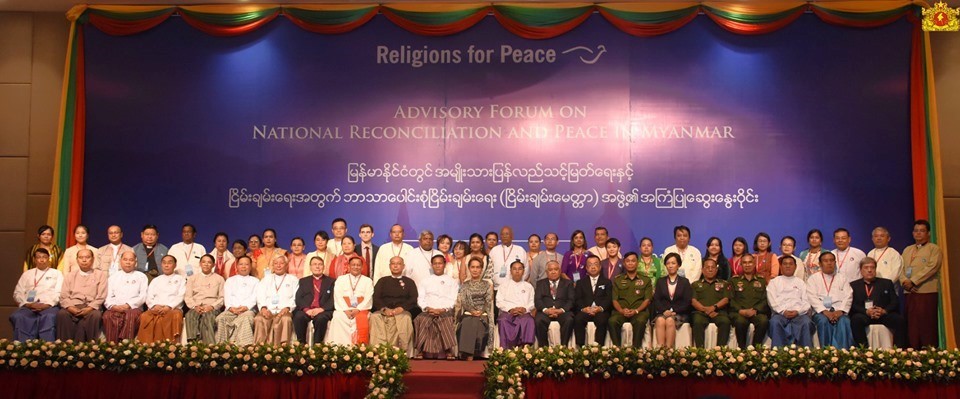Religions for Peace Convenes Second Advisory Forum in Myanmar Focuses on Religion in Nation-building
May 8, 2019(7-8 May 2019 | Nay Pyi Taw, Myanmar) As the increased level of armed conflict in Rakhine State endangers the prospect of peace and further stalls the return of refugees from across the border with repercussions for the nationwide peace process, Religions for Peace (RfP) convened the 2nd Advisory Forum on National Reconciliation and Peace in Myanmar. The RfPAdvisory Forum brought together over 200 representatives of religious organizations, Myanmar government and the military, parliament, ethnic organizations, foreign governments, UN agencies, international and national NGOs and civil society groups in Nay Pyi Taw, Myanmar on 7-8 May 2019.
Appreciating news at the opening of the Forum that two Reuters journalists were freed, Bishop Gunnar Stalsett [RfP International, Honorary President], noted in his opening address that the RfP Advisory Forum is:
“One of many roads towards a future where the people of Myanmar will enjoy the full measures of democracy, truth and reconciliation in the beautiful land of promise and hope. … The abhorrent terrorist attacks and the mass murders against Christians in Sri Lanka two weeks ago, and the similar massacres on Muslim worshipers at a Mosque in New Zealand and Jewish believers at prayer in a synagogue in Pittsburgh are among the many signs of religion being massively perverted. [O]ne of the most dangerous features of the 21st century is how religious extremists join murderous hands with likeminded nationalistic, ethnic and racist individuals and movements, destroying innocent lives worldwide.
This is not religion- this is apostasy.
This is not faith – this is perversion.
This is not loving- this is hatred.
This is not truth – this is deceit.
This is not tolerance – this is discrimination.
This is not respect – this is scorn.
Against this destructive expression of faith gone amok, we hold a different conviction, a genuine profession of faith: religion is pro-love, pro-life, pro-justice, pro-truth. Religion is freedom. Religion is peace.”
H.E. State Counsellor Daw Aung San Suu Kyi delivered her opening address and emphasized the significance of RfP Advisory Forum and the role of religion in advancing positive peace. “RfP is bringing about important progress for peace. The second Forum is important to advance human dignity, democratization and to find solutions to national challenges,” she stated in the keynote address in the opening session.
The Forum welcomed the release of several hundred prisoners including two Reuters journalists and expressed hope that it contributes to urgently needed confidence building and to freedom of the press. The Forum participants also welcomed an extended ceasefire and urged all parties to continue efforts to make it permanent. The critical situation in Shan and Kachin States together with Rakhine armed conflict needs urgent comprehensive initiatives supported by the international community to advance peace and reconciliation. The Forum continues to support the recommendations from Kofi Annan’s Report as a viable roadmap towards peaceful and fair future for the people of Rakhine State.
H.E. Cardinal Charles Bo [RfP Myanmar, Patron] stated that “we gain nothing from fighting each other, killing our brothers and sisters. Those who grew up in conflict areas fear they will never taste peace. All of us here in the RfPAdvisory Forum are walking the path of peace. Myanmar is a blessed nation with more opportunities than it has challenges.”
U Myint Swe [President, RfP Myanmar] stated that “challenges faced in Myanmar are exacerbated by a critical lack of ‘open space’ in which to safely meet, dialogue, and discern a consensus on necessary responses. To respond to the critical lack of ‘open space’ for dialogue and cooperation among all stakeholders, participants committed to building and strengthening a unique multi-religious and multi-stakeholder mechanism for dialogue and action ‘RfP Advisory Forum and its Standing Commissions.’”
With the support of H.E. State Counsellor Daw Aung San Suu Kyi, the RfPAdvisory Forum was inaugurated in Nay Pyi Taw in November 2018, bringing together over 300 participants, with key stakeholders from religious organizations, Myanmar government and the military, parliament, ethnic organizations, foreign governments, UN agencies, international and national NGOs and civil society groups. One hundred strategically selected key stakeholders met under “Chatham House Rule” to collectively identify the common challenges facing Myanmar.
This led to the establishment of Standing Commissions on five sub-themes:
- 1) Education,
- 2) Equal Rights and Responsibilities for All Ethnic Communities,
- 3) Women’s Empowerment and Participation,
- 4) Youth Empowerment and Engagement, and
- 5) Identity, Diversity, and Common Challenges in Rakhine State.
The participation of women leaders in the 1st RfPAdvisory Forum, who comprised nearly 60% of all presenters, facilitators and speakers, was a driving force behind its success.
Based on recommendations for the government and multi-stakeholder commitment to action advanced by the RfPAdvisory Forum and its Standing Commissions, RfP Myanmar and participating stakeholders will implement activities directly addressing the five sub-themes including, but not limited to, vocational trainings for youth, teachers’ training, empowerment workshops, support for students from conflict areas to be provided access to higher education with freedom of movement, and the strengthening of representative and action-oriented local inter-religious mechanisms.
